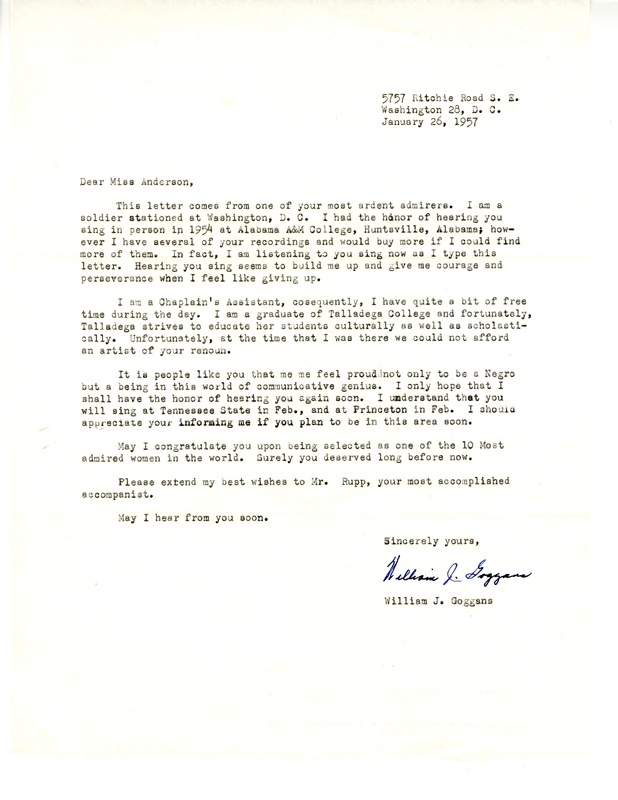-
Title
-
Letter, William J. Goggans to Miss Anderson, January 26, 1957
-
Description
-
A typed letter from then soldier, educator, and musician William James Goggans (1933-2003) to globally renowned contralto Marian Anderson Fisher (1897-1993). In his letter, Goggans expresses his admiration for Marian Anderson. He congratulates her for being selected as one of the 10 most admired women in the world and asks her to inform him if she plans to perform in the Washington, D.C. area in the near future.
-
This letter is among many from students, aspiring singers and musicians included in the Marian Anderson Papers. Anderson's life was an inspiration to them and to countless others in the United States and abroad (Kruesi 1998).
United States Army veteran, educator, and musician William “Bill” James Goggans was born on March 12, 1933 in Alexander City, Alabama. He was passionate about modern languages and committed his life to its study and teaching. He was also an avid organist and pianist that played at numerous community events. He died on January 7, 2003 and is buried in Lincoln Hills Cemetery in Gadsden, Alabama.
Marian Anderson was born to Anna Delilah Rucker Anderson and John Berkeley Anderson in South Philadelphia, Pennsylvania on February 27, 1897. She was the first of three girls all of whom sang. Anderson performed a repertoire that included over 200 songs of many genres including traditional Black spirituals, folk music, and “arias in German, Italian, English, French, Spanish, Portuguese, Swedish, Finnish, and other languages” (Kruesi 1998). She performed in the United States, South America, Europe, and Asia. Her career spanned from the 1920s through the 1970s–although she formally retired in 1965 (Kruesi 1998). Anderson’s achievements were numerous and iconic. In 1936, she became the first African American invited to perform at the White House (American Experience and PBS, 2017). In 1955, she was the first African American woman to be invited to sing at the Metropolitan Opera in New York (American Experience and PBS 2017; Brown-Cáceres 2013). At one point, she was the third highest concert box office draw in the United States (American Experience and PBS 2017). In 1963, she was awarded the Presidential Medal of Freedom by President Lyndon B. Johnson, the Congressional Gold Medal in 1977 during the Carter administration, and bestowed with the Kennedy Center Honors in 1978 (National Archives 2024).
Despite her artistry, popularity, and global impact, the United States subjected Marian Anderson to racial prejudice like all African Americans of her time including the Daughters of the American Revolution (DAR) Constitution Hall incident, which is arguably the most famous of these racist affronts. In 1939, Anderson’s manager tried to secure her performance at Constitution Hall. However, DAR denied her the opportunity because she was Black. In response, Marian Anderson performed a free, open air, integrated, Easter Sunday concert on the steps of the Lincoln Memorial in Washington, DC on April 9, 1939. An estimated 75,000 people attended (Marian Anderson 1939).
Anderson married Orpheus “King” Fisher on July 24, 1943. Between tours, together they lived on their farm near Danbury, Connecticut until his death in 1986. Anderson continued to live on her farm well into her nineties. She spent the last seven years of her life in Portland, Oregon with her nephew, conductor James DePriest, and his wife Ginette (Penn Libraries, n.d.).
She died of congestive heart failure on April 8, 1993.
More information is available in the annotation of the letter.
-
Rights
-
Copyright restrictions may exist. For most library holdings, the Trustees of the University of Pennsylvania do not hold copyright. It is the responsibility of the requester to seek permission from the holder of the copyright to reproduce material from the Kislak Center for Special Collections, Rare Books and Manuscripts.
-
Creator
-
University of Pennsylvania: Kislak Center for Special Collections, Rare Books and Manuscripts
-
Date
-
1957-01-26
-
Format
-
Text
-
Language
-
eng
-
Spatial Coverage
-
Washington, D.C.
-
Contributor
-
University of Pennsylvania libraries
-
Extent
-
1 page
-
Identifier
-
Ms. Coll. 200 Box 126
-
Subject
-
African American women singers
-
Anderson, Marian, 1897-1993
-
Correspondence
-
Historically Black colleges and universities
-
Letters
-
Soldiers
-
Talladega College


